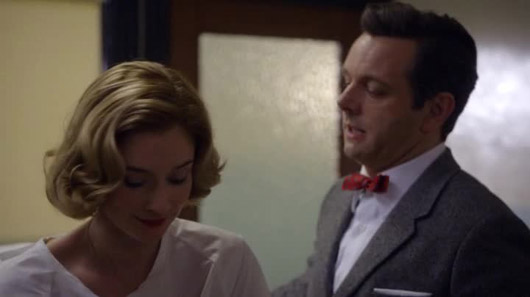 TV
TV In Which We Routinely Roll Our Eyes At Institutional Sexism
 Monday, October 7, 2013 at 11:44AM
Monday, October 7, 2013 at 11:44AM 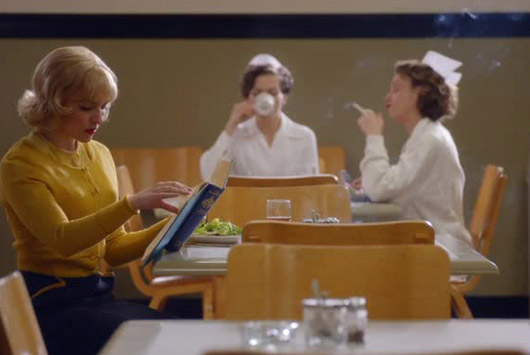
For Sex and For Science
by RACHEL SYKES
Masters of Sex
creator Michelle Ashford
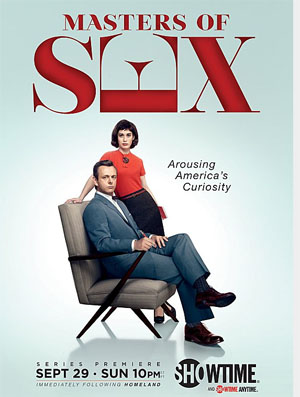 There is an awkward moment in the second episode of Showtime’s Masters of Sex, and it happens fully clothed. It’s October 1956 and a young woman, called Jane, is reading alone in the canteen of Washington University Hospital when she is approached by two men. The first is married and intent on beginning an affair which she, politely, declines. The second asks her to recommend the sluttiest girl in the room. Again, Jane declines, laughing at both parties as she pulls the book’s title into view. As she reads aloud, the audience is copied in on the joke. These men never had a chance: Jane’s reading The Second Sex.
There is an awkward moment in the second episode of Showtime’s Masters of Sex, and it happens fully clothed. It’s October 1956 and a young woman, called Jane, is reading alone in the canteen of Washington University Hospital when she is approached by two men. The first is married and intent on beginning an affair which she, politely, declines. The second asks her to recommend the sluttiest girl in the room. Again, Jane declines, laughing at both parties as she pulls the book’s title into view. As she reads aloud, the audience is copied in on the joke. These men never had a chance: Jane’s reading The Second Sex.
The prop department’s brief nod to philosophy would be laughable, if it wasn’t so sincere. Jane’s moment of triumph in the canteen is short, but the agenda bashing flash of The Second Sex is part of a disarming directness that runs throughout the show’s opening episodes.
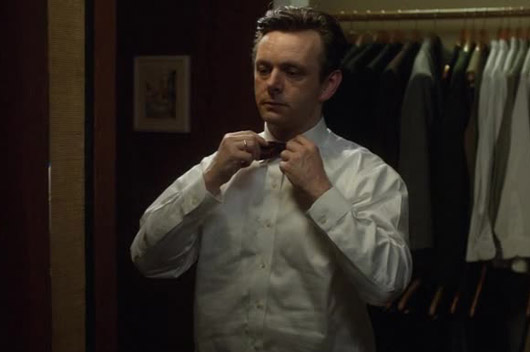
Based on Thomas Maier’s 2009 biography, and inheriting its unenviable title, Masters of Sex is the True Hollywood Story of respected gynaecologist William H. Masters (Michael Sheen) and his secretary-turned-collaborator Virginia Johnson (Lizzy Caplan) as they begin their ground-breaking research into human sexuality.
This much history, and Google, can fill in: Masters and Johnson worked for nearly forty years to develop a scientific dialect for the various stages of copulation, tireless in their pursuit of a language for orgasm that moved beyond puritanism and witchcraft. From the first episode, we see the difficulties of turning sex into science; their work was in constant danger of being shut down, by every possible authority. Masters of Sex begins with their first tentative, illegal encounters as they trail brothels in search of willing subjects, and continues as Masters, a frigid but rigorous scientist, and Johnson, a sex positive anachronism, convince the chastened university to work in their (sexual) favour.
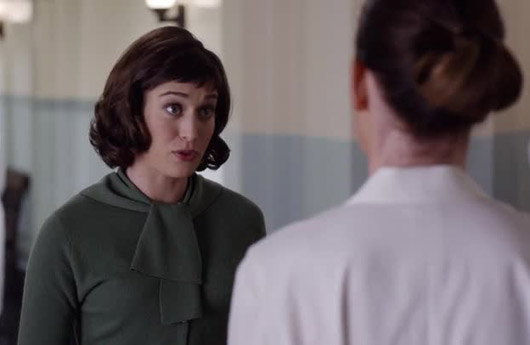
With this relationship at its heart, Masters of Sex can’t afford to stand on ceremony. It’s a tale of unravelling and revealing, of candour and seriousness, of reclaiming what is deemed unknowable as a field of potential discovery. Sex is the ultimate unmentionable and the clothes are off within the first few minutes. By the end of the pilot, Masters and Johnson are brandishing a vibrator/camera named ‘Ulysses’ as the provost of the university (a wonderfully perplexed Beau Bridges) internally monitors poor Jane’s climax.
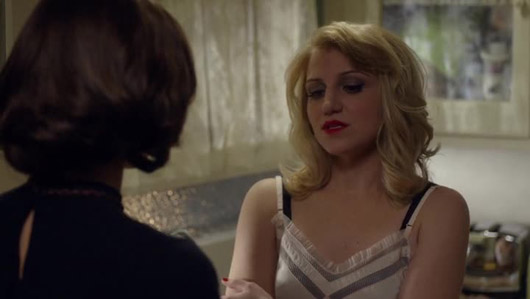
To both anticipate and suppress the snickers, however, Masters of Sex offers up a sincerity which, it turns out, is the most disarming of their devices. Take Jane, for example. Despite the fact that her boss is sitting somewhere between her thighs, Johnson coerces her into staying with a series of grandiose and po-faced lies. “He’s not watching you,” she claims, “He’s watching science.” This is a line that Johnson peddles repeatedly and that people repeatedly buy, slowly building the idea that this study could be the greatest step for women since they obtained the right to vote.
Jane blithely and robotically chants about her contribution to science, and Masters, too, states motives of the highest order, ranting to the disapproving provost that he studies in the name of truth, unchartered territory, and, of course, the Nobel Prize. “Science!” is the show’s real battle cry, but it becomes more of a central thesis then the sex itself.
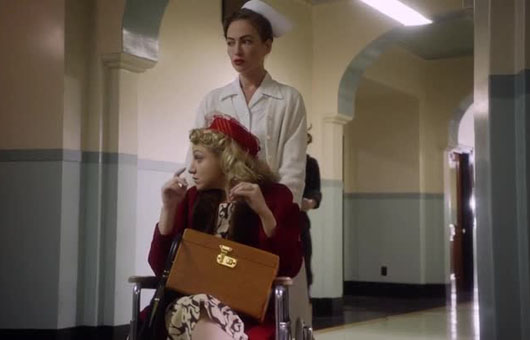
Masters of Sex was created by Michelle Ashford, the show runner on HBO’s The Pacific and John Adams. Ashford describes herself as “a perpetual student” and her loyalty to historical detail, to biography, make her shows oddly free of subtext. This is even more evident in Masters of Sex where the title gives up the game before any flesh has reached the screen; Ashford seems to embrace the fact that the story’s end is a foregone conclusion. This is a show refreshingly unafraid of spoilers, liberated by the fact that there’s no detail on Masters and Johnson that couldn’t be looked up online.
In other words, it’s a show without a climax, and a show about sex without a climax. Stripped of intrigue, it’s also markedly different from Mad Men to whom comparisons seem inevitable, if a little unfair. It’s not until midway through the pilot episode, as Caplan gamely juggles a mid-century secretarial pool and a wrathful ex-lover, that you realise how Draper might have ruined it for the rest.
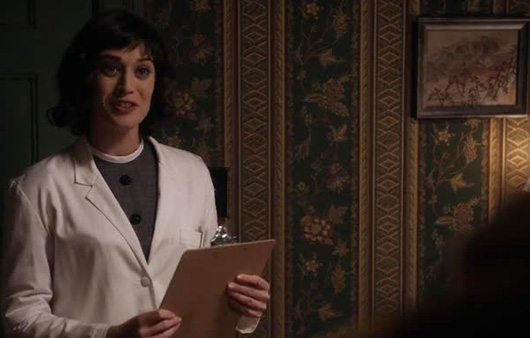
When Sheen is introduced to the audience as Masters, at a lavish dinner in his honour, we can’t help but ask what’s wrong with him. But unlike Mad Men, where each episode is bound up in the slow reveal of hidden foibles, everything is already on display. To make this point more blatant, Masters proposes sex to Johnson, as part of their experiment, within the first episode. Is he attracted to her? More than likely. But Ashford knows there’s no point in keeping the audience guessing.
What’s telling, though, is the weight of this hindsight. If we think about that moment with The Second Sex once more, we suppose that Jane can laugh as the men approach because she knows that the tide is turning. We, the audience, see change as inevitable because we live in the progressive future. But the bluntness of this technique is also a kind of double-bluff. Masters of Sex approaches sexism with the same sensibility of Mad Men, presenting it as so overwhelmingly pervasive that it constantly knocks you on the head. When we meet Virginia Johnson, we roll our eyes at the institutional sexism she faces just to enter the typing pool. Yet we only laugh at how times have changed before we realise how little they have. De Beauvoir hovers somewhere out of shot not from narrative ham-fistedness, but because it is still jarring to see her name in passing. And we can only laugh at the prudishness of the 1950s, until the instinct to giggle takes us over.
Rachel Sykes is the senior contributor to This Recording. She is a writer living in Nottingham. You can find an archive of her writing on This Recording here. She tumbls here and twitters here. She last wrote in these pages about the storm outside.
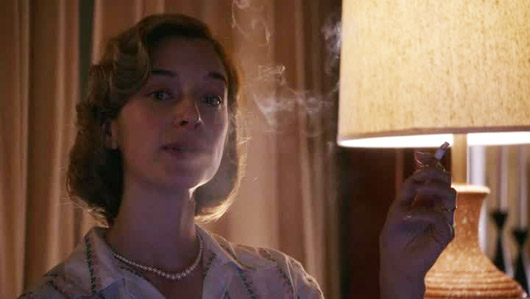
"Heaven Go Easy On Me" - The Head and the Heart (mp3)
"Cats and Dogs" - The Head and the Heart (mp3)
